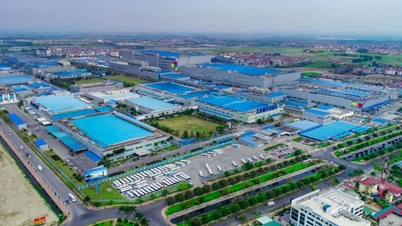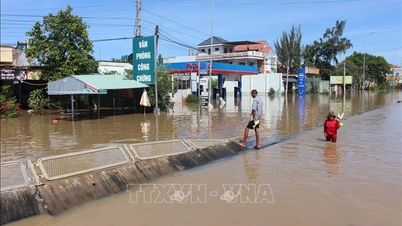
According to experts, traceability in Vietnam has developed widely in recent times, but the quality of implementation has not been as effective as expected. The reason is that the current traceability system is still quite scattered, each ministry, branch, and locality has its own system with different criteria, leading to incompatibility and not sharing data with each other. In addition, many businesses create their own traceability codes, but the descriptive information is only one-sided, self-published by businesses without close supervision from state management agencies. When disputes arise, there is no basis for comparing information, making it difficult for consumers to protect their legitimate rights.
Therefore, it is necessary to have a unified national traceability system to connect and share data between ministries, branches and localities. This system will help unify criteria, increase transparency and reduce operating costs for both the State and enterprises. Because when concentrated on a national focal point, with unified direction from the Central to the local level, all traceability activities will be operated smoothly, data will be updated centrally, making inspection, supervision, and handling of violations more convenient.
Mr. Tran Huu Linh - Director of the Department of Domestic Market Management and Development ( Ministry of Industry and Trade ) emphasized that in the context of deep integration, when Vietnam participates in many free trade agreements (FTA), transparency of the origin of goods has become a vital requirement. This is not only the task of the management agency, but also the responsibility of businesses and consumers. Because only when products have clear "identification" on origin, production process, quality and circulation journey, can the market operate transparently and sustainably.
According to Mr. Tran Huu Linh, identification and traceability are two pillars of modern market management. In the context of strong e-commerce development, controlling the origin of products circulating on online platforms is becoming more urgent. In reality, cases related to the sale of counterfeit goods, fake goods, and goods of unknown origin in the digital environment are on the rise, negatively affecting the reputation of legitimate businesses and the interests of consumers.
The Ministry of Industry and Trade has directed market management forces to strengthen inspection and supervision of online business activities, coordinate with e-commerce platforms to detect and strictly handle violations. At the same time, promote the application of digital technology in supervision, build a database of goods and circulation routes, gradually moving towards the goal of data-based management instead of relying only on traditional inspection.
“Traceability is not only a technical tool for market management, but also the key to opening the door to sustainable development for domestic trade. When goods are clearly identified and traceable, genuine businesses will be protected, consumers’ rights will be guaranteed, and trust in Vietnamese goods will be firmly consolidated,” Mr. Tran Huu Linh emphasized.

Sharing about this issue, analysts also pointed out that, while in the past, businesses only needed to prove product quality with certificates or labels, now traceability has become a mandatory standard in all transactions, especially with exported goods. In the EU, Japan or the United States, importers only accept shipments with electronic traceability data that allows verification of the entire process from production to consumption. Therefore, in the digital age, data transparency is a prerequisite for building trust. A product cannot go far without authentic information about its origin, production process and quality control.
Vietnam is currently building a shared data platform for the industry and trade sector, connecting information from manufacturing enterprises, e-commerce platforms, inspection agencies to the state management system. When data is transparent, every step from management to consumption is more effective, while limiting commercial fraud and counterfeit goods, especially in the online environment.
Mr. Nguyen Van Thanh - Head of Policy Department - Department of E-commerce and Digital Economy (Ministry of Industry and Trade) said that the boom of e-commerce has opened up huge opportunities for Vietnamese businesses to access a wide market, especially young and international consumers. However, along with that are many challenges, notably the increasing appearance of poor quality goods, goods of unknown origin, and fraudulent origin, eroding consumer confidence.
According to Mr. Nguyen Van Thanh, traceability is an important foundation for e-commerce to develop in a transparent, green and sustainable direction. When each product is clearly labeled with a traceability code, consumers can check all information about the origin, production process, quality certification as well as environmental factors throughout the product life cycle. This is a green passport that helps buyers easily identify environmentally friendly, cleanly and responsibly produced products, thereby making green consumption choices, promoting sustainable consumption trends in society.
In addition, the traceability system also helps businesses closely control the supply chain, optimize production, reduce waste and emissions, contributing to the goal of green growth. Transparency of product information also helps Vietnamese businesses improve their competitiveness and meet the increasingly strict environmental standards of the international market.
Not only stopping at traceability stamps, Vietnam is aiming for a “digital passport” model for products to integrate all data on production processes, inspection certificates, transportation, storage and consumption so that buyers can verify with just a few steps. This is a way for each product to have a unique digital identity, authenticated and protected by technology. When data is transparent, businesses not only have easy access to export markets but also enhance brand reputation, avoiding the risk of returned goods or loss of market share.
Furthermore, blockchain technology, artificial intelligence (AI) or product identification codes are being applied by many Vietnamese enterprises in supply chain management, especially with agricultural products, food, pharmaceuticals, etc., requiring transparent traceability. However, the most important thing is to unify data standards and connect and share between parties from management agencies to businesses and consumers.
According to experts, transparency is not just about making data public, but also about ensuring the integrity of information. When data is authenticated and updated continuously, businesses will control risks and consumers will feel secure in their choices. This is the foundation for forming digital trust, a vital factor in today's e-commerce environment.
As global trade increasingly emphasizes transparency, traceability requires not only technical requirements but also commitments to responsibility and quality. Each Vietnamese product that is clearly identified and linked to authentic data will step out into the world more confidently. Therefore, transparency becomes a bridge between businesses and consumers, between domestic and international markets, helping Vietnamese goods not only go further but also stand firmer with prestige and brand value.
Source: https://baotintuc.vn/kinh-te/xay-dung-niem-tin-tu-minh-bach-du-lieu-hang-hoa-20251017171531283.htm







![[Photo] Cat Ba - Green island paradise](/_next/image?url=https%3A%2F%2Fvphoto.vietnam.vn%2Fthumb%2F1200x675%2Fvietnam%2Fresource%2FIMAGE%2F2025%2F12%2F04%2F1764821844074_ndo_br_1-dcbthienduongxanh638-jpg.webp&w=3840&q=75)








































































































Comment (0)